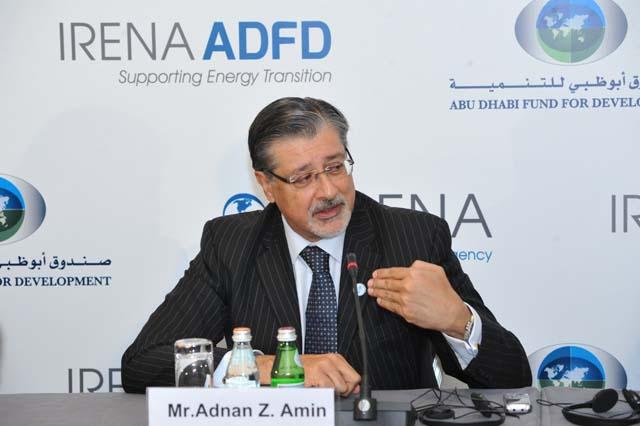You are here
Renewables use can save $750b in Mideast, Africa — official
By Agencies - Apr 04,2016 - Last updated at Apr 04,2016

Adnan Amin, director general of the International Renewable Energy Agency, talks to the press in Kuwait City on Monday (AFP photo)
KUWAIT CITY — Middle Eastern and North African (MENA) nations can make a "net benefit" of $750 billion if they achieve their set targets on the use of renewable energy, a senior official said on Monday.
"Almost every country in the [MENA] region has a target for renewable energy from 5-15 per cent," by 2030, Adnan Amin, director general of the International Renewable Energy Agency told reporters.
"If we are able to meet these targets, we will have a net benefit of about $750 billion for the power sector in the MENA region," Amin said on the sidelines of the sixth MENA renewable energy conference.
Amin added that the world is looking to double the current share of renewable energy of 16-17 per cent in the global mix to 36 per cent by 2030.
He continued that doubling the renewable energy share will help achieve the reduction by half of carbon emissions which would a pre-requisite for limiting global warming to 2°C as decided by the Paris climate change summit.
Amin told the conference that global investments in renewable energy rose by 22 per cent last year to a record $330 billion.
The cost of production of renewable energy has dropped significantly in the past few years, he said.
In the past five years, the cost of solar photovoltaic power generation dropped by 80 per cent, Amin indicated.
"It is already competitive with natural gas. There can be further reduction in cost," he added.
But Bassam Fattouh, director of Oxford Energy Institute Studies, said the targets set by MENA countries are "very ambitious”.
He said several challenges hamper renewable energy production in the region, like state monopoly of the power system, a lack of institutional capacity and conventional energy subsidies.
Nearly half of all new installed power generation capacity in 2014 was in renewables — 37 per cent wind, a third solar and a quarter hydro, according to the International Energy Agency.
Renewables only account for about 20 per cent of global electricity generation, and three-quarters of that is hydro.
Separately, trillions of dollars of non-bank financial assets around the world are vulnerable to the effects of global warming, according to a study on Monday that says tougher action to curb greenhouse gas emissions makes sense for investors.
Rising temperatures and the dislocation caused by related droughts, floods and heatwaves will slow global economic growth and damage the performance of stocks and bonds, according to the report, led by the London School of Economics.
"It makes financial sense to a risk-neutral investor to cut emissions, and even more so to the risk-averse," lead author Professor Simon Dietz, an environmental economist, told Reuters.
A global climate summit in Paris last December set a goal of limiting global warming to "well below" 2°C above pre-industrial times, while leaving open precisely how this would be achieved.
If the rise were limited to 2°C by 2100, the study's central scenario put the total of current financial assets that could be damaged at $1.7 trillion. But if the temperature rose a further 0.5°C by the end of the century, $2.5 trillion would be at risk under the most likely scenario.
Global regulators in the Financial Stability Board (FSB) say all the world's current non-bank financial assets are worth $143 trillion.
At the extremes of the study's thousands of scenarios based on a 2.5°C rise, the value at risk ranges from 0.5 per cent of total financial assets up to a worst case of 17 per cent, or $24 trillion.
The study did not try to identify which sectors were most at risk from the damage that climate change can wreak, ranging from the destruction of buildings, bridges or roads by storms or floods to losses of agricultural productivity and enforced movement of populations.
Many previous studies about the financial impact of climate change have focused on fossil fuel companies, together worth around $5 trillion on stock markets, whose shares may lose value if investors shift to cleaner energies.
Stephanie Pfeifer, head of the Institutional Investors Group on Climate Change (IIGC), told Reuters the report was "yet more evidence that unabated climate change would negatively impact economic growth and investment returns over the long term".
She urged investors to put pressure on company boards to disclose risks from climate change and to ensure that their businesses were on track to limit rising temperatures. The IIGC represents 120 investors controlling more than $13 trillion in funds.
Last Friday, a task force of the FSB unveiled plans for all listed companies to disclose in financial reports how climate-related risks could hit their bottom line.
Related Articles
RIYADH — Saudi Aramco said it would start taking bids from investors on November 17 in a highly anticipated stock offering, as it released a
Renewable energy is the most viable approach for the future of Jordan and regional countries, according to International Renewable Energy Agency (IRENA) Director General Adnan Amin.
RIYADH — Saudi Aramco said it has signed a $15.5 billion lease and leaseback agreement for its gas pipeline network with a consortium led by


















